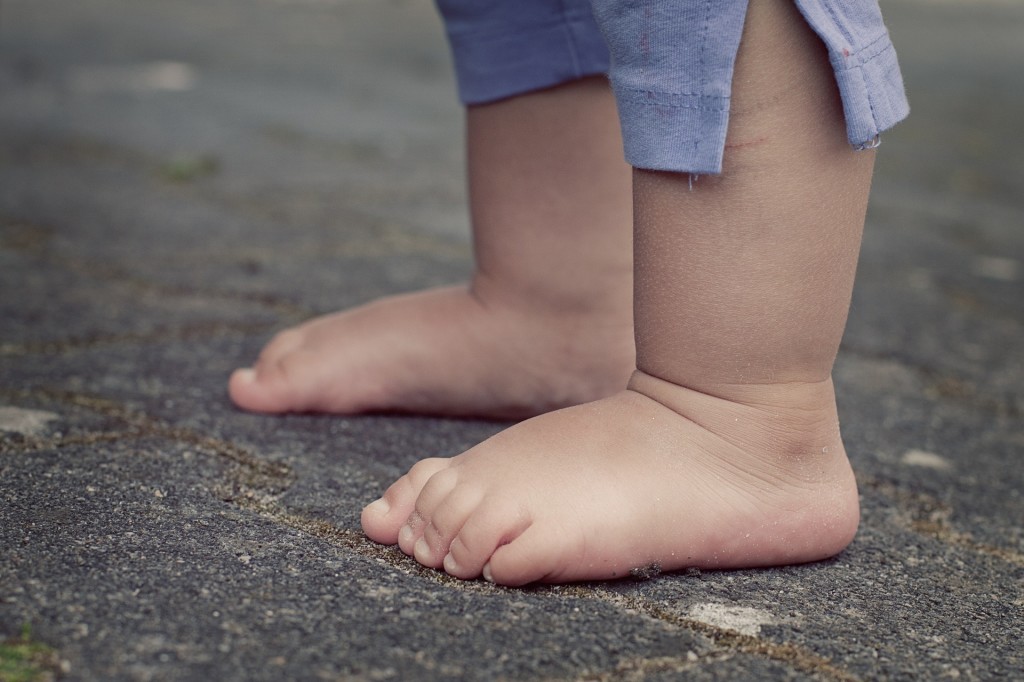
It had been a long night, and I was so close to being on the other side of it. Then halfway through the last verse of the last bedtime song, you lifted your head up. “Wawa?” you asked.
I took a cursory glance around the room, knowing I wasn’t going to see a sippy cup. “There’s no water up here. You’re fine.”
“Wawa?”
“Honey, no.”
“Wawa!”
More insistent this time. And my anger flashed to the surface, fast and red and hot and fiery. A quick intake of breath. My body stiffened, my teeth clenched. And of course you felt it. Despite my quickly stifling it, you felt it as clearly as I did, and you melted into me.
Your tiny body shook with sobs because the person you love most in the world, the person who you depend on for everything you need, turned momentarily monstrous because you wanted water. Because you were thirsty before going to bed and you have no autonomy with which to resolve your problems.
Imagine living life with that kind of lack of control. We talk a lot about how hard it is to be a mom, and with good reason — this gig is anything but easy. But the second week of April is “The Week of the Young Child,” and in its honor I’d like to acknowledge how hard it is to be a small child.
As a therapist, I often try to imagine what life is like for young children. If I want to find a solution to difficult behavior, I first have to try to understand it. And each time I put myself in the shoes of a young child I come to the same conclusion: Not a single one of us adults could cope with the things they have to cope with.
For starters, think about being told what to do, when to do it, and how to do it — endlessly. Eat this thing that you’ve never seen before. Don’t make a rude face (what does rude mean?). It’s time to go somewhere you don’t want to go, and hurry, hurry, hurry to meet an arbitrary timeline that means nothing to you.
Imagine failing as much as a young child does. Not being able to make your hands move the right way to cut the paper, stumbling as you run across the lawn, spilling the milk you so desperately wanted to pour (and here I am, exasperated with him again).
Another bedtime example:
“Dad, tell me how the guy got up there.”
“He climbed.”
“NO, tell me how he got up there?”
Over and over again, our son becomes more and more frustrated until I realize he meant to say, “ASK me how he got up there?”
One wrong word changing the whole sentence and causing all that frustration. Imagine constantly failing to effectively communicate with the people in your life. Day after day, struggling to find the right word, saying one thing when you mean another, mispronouncing words so much that nobody knows what you’re saying. And then having people get frustrated with YOU, lose patience with YOU.
One of my favorite books to read with the kids is “Everywhere Babies.” The last page reads, “Everyday everywhere babies are loved. For trying so hard, for traveling so far, for being so wonderful, just as they are.” I tear up almost every time I read it because it’s so true. In spite of it all, they try and they try and they try again. They greet their days with smiles, enthusiasm, and excitement. They forgive our mistakes, our flashes of fiery, unfair anger. They meet our impatience with patience (at least sometimes), they laugh and live and love with reckless abandon.
So when they push us to the edge of our limits, let’s try to remember that we’re doing the same thing to them.
Happy “Week of the Young Child”!















John Holt wrote a book “Learning all the Time”.
His observations on how infants and toddlers learn are superb, and 100% accurate.
Other work by Joseph Chilton Pearce and David Chamblerlain have looked at pre-natal development of consiousness, and their insights are very useful.
Quite often, we adults DO relate to children, toddlers, in ways that are less than sensitive to what it is like being a child, an infant, a toddler because we have forgotten our own experience.
And bear this in mind, we all went through this as infants and toddlers, and it wrote a series of neural pathways and behaviours that remain until we see them and start to resolve them….. not because our parents intended it, it is just the nature of experience/environment and how the human organism ‘adjusts’ to what we are presented with.
That experience so well described above is then repeated in schooling where for 12 years we are told what to do, what to wear, what to THINK without any adult meeting us in exploration of what we think and feel.
The extrapolate that across a population and imagine the possible effects and emergent psychology of that population and you can begin to sense the depth of the rabbit hole of social conditioning and indoctrination – hints of which have emerged in some of the comments above.
wow some people are freaking mean to there kids. like no water and i mean it now bed with your dry mouth. Some of these parents need to grow up.
Absolutely Beautiful, thank you for this article. It made me cry but it also made me think. I will from now on try as good as I can to see the life from my sons point of view❤️Tack
Good to remember this- I often think about how things are for a young child… I moved to another country, alone as a young adult, and lived (volunteered) in an orphanage in a small village where no one spoke much English for many years. They showered with a bucket, used squatty toilets, and ate food that was very strange to me and difficult for me to eat. I struggled a lot for a time, not being able to communicate well (hardly at all in the beginning), taking time to learn how to use their kind of shower and toilet, how to stomach their food- it made me feel more understanding of what little kids experience as they learn to cope with the world. It’s hard and I think it’s good to recognize that and understand their needs and struggles (no matter what your “bedtime discipline” philosophy is).
I too cry every time I read Everywhere Babies . Kids do have a trying time of it. As do their parents. I wish I hadn’t read the comments.
But since I did…
Everyone needs to just give themselves and other parents a lot more grace and remember, “only love today.”
This is a great article. Sometimes we as parents do forget how dependent they are on us and we are just to frustrated, tired, orstressed at the time to remember it. So yes while it is just a glass of water, sometimes all we can think of is relaxing “Just for a second”. It doesn’t make us bad parents or mean we Love our kids any less. We are fallible humans. And an article like this helps us to stop and realize that we are all in this learning experience together. I think it’s a sad that someone can sit there and cast judgement. If you have never experienced what the author of this article is talking about then Great On You for being the perfect parent, but don’t be that person who has to say negative things because you have never experienced or felt that way. This article offers great insight and may just be what someone needs to hear.
I cried reading this article. It’s so true and just today I got so mad at my son who was nagging and whining non stop. I yelled out of frustration “what do you want?” He cried and of course I calmed down, picked him up and told him that I’m sorry and started asking him what is wrong. He is only 1 so he can’t talk yet and I can imagine how hard that must be for him after reading this article.
Personally, I would like to see less wishy washy parents, not more. Children need guidance and they do need to understand authority. Bedtime is one of those times when children test us because they don’t want to go to bed. You don’t have to be mean but there are too many parents in a constant state of empathy for their kids whether they need it or not. Those parents are going to get walked on by their kids and their kids will not grow up to be respectful citizens understanding the value of working for what you get. When I read articles like this, it just serves to further the problem we have in our nation right now which is a generation of people who are weak and feel entitled. If you think it doesn’t start with this kind of thing, then that explains a lot about why we are where we are right now. I agree with what someone said about the parent needing to examine herself to figure out why she would get so mad at her child instead of just dealing with the issue gently. If the child is frustrated because she doesn’t get the water, I think she will live and learning you don’t always get what you want is character building. Don’t feel sorry for the child. Ultimately, kids do want boundaries. Parents who don’t offer and enforce those boundaries are depriving their children basic needs.
This brought tears to my eyes! I strive to be a gentle parent, but on those challenging days, I’m going to remember this article to help me dig a bit deeper!